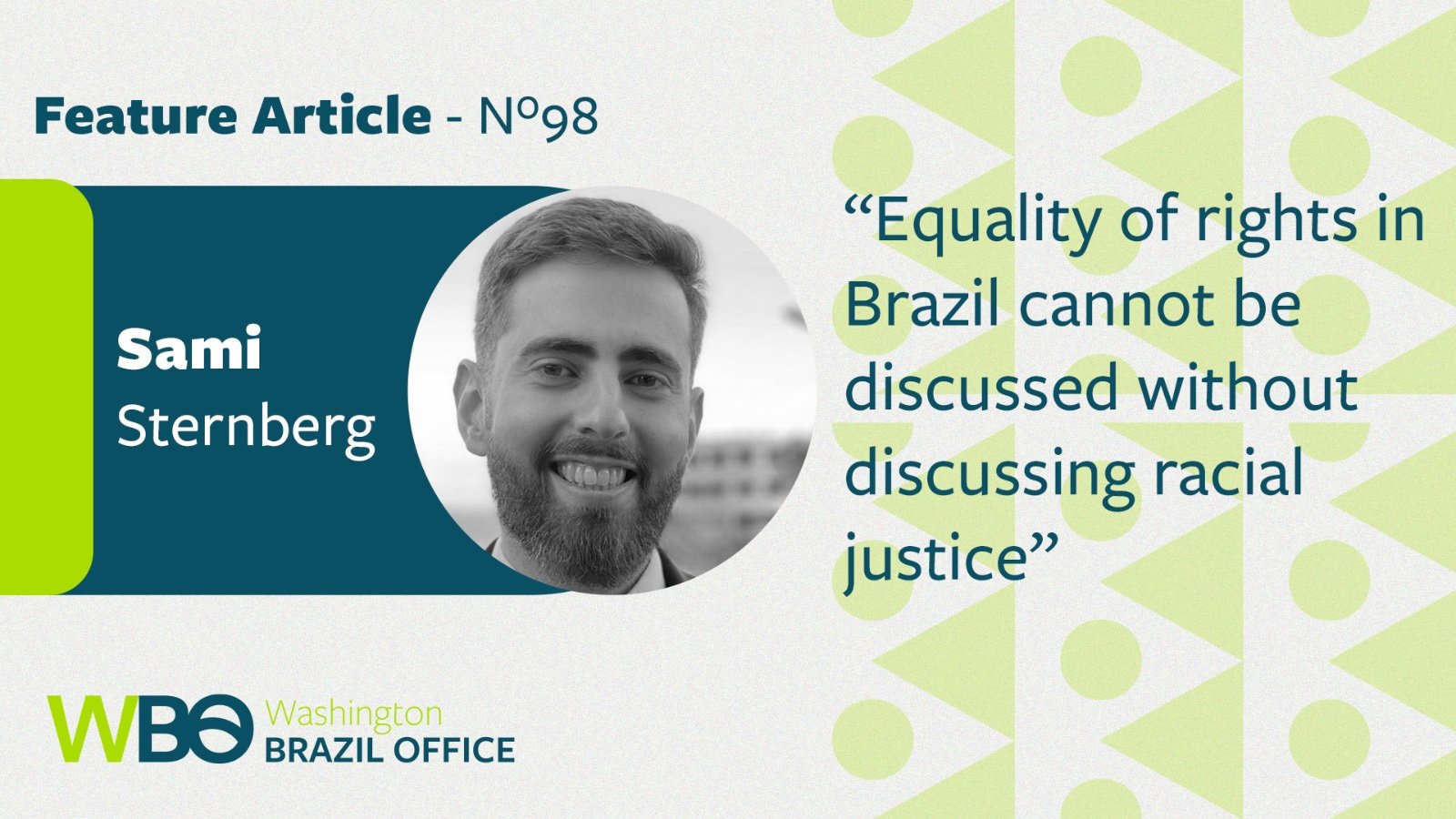The WBO’s action as an ally in the anti-racist fight
Sami Sternberg has a master's degree in International Relations from Columbia University and is the Coordinator of Institutional Relations at the Washington Brazil Office (WBO). This article was written for issue 98 of the WBO weekly newsletter, distributed on December 22, 2023. To subscribe and receive the newsletter for free, simply enter your email in the form at the footer of the article.
The Washington Brazil Office’s decision to be an allied organization in the anti-racist fight and consider this agenda a priority is no coincidence. The history and construction of Brazil are characterized by the atrocious process of enslavement of Black people brought from the African continent during periods of colonization and the empire, whose profound marks are still present today.
Even with the central role of the resistance of the Black population in the fight for their freedom and guarantee of rights, the Brazilian State and society as a whole have consolidated a structure that discriminates, oppresses, and prevents the full exercise of rights of this group, which represents 56 percent of the Brazilian population and is wrongly classified as a minority. This is reflected in all the statistics about the reality of the Black population in Brazil, such as violence (80 percent of homicide victims), incarceration (68.2 percent of the prison population), religious intolerance (significant increase in cases against African-based religions ), economic inequality (50 percent lower wages), among many others.
The WBO has, since its creation, carried the challenging mission of supporting the international work of Brazilian civil society in its plurality of agendas. Of the various initiatives carried out during 2023, assistance to Brazilian Black movements in the international sphere stood out due to an intense calendar of activities, in addition to clearly illustrating how we establish our support for Brazilian organizations.
Equality of rights in Brazil cannot be discussed without discussing racial justice. Therefore, in response to a demand from affiliated Black organizations, the WBO listed this agenda as the first and main focus in implementing its programmatic activities. Thus, at the end of 2022, the WBO set up a Working Group alongside more than 10 organizations from Brazilian Black movements (today there are 16). The GT was created with the objective of promoting the convergence of dialogues and strategies of movements, hoping to: a) increase the impact of civil society advocacy in international arenas; and b) expand the horizons of this international activity. The guiding principle for this process to work is the protagonism of the voices and interests of the movements, which design and lead the execution of the GT's work plan. The WBO replicates this work methodology based on active listening and collective construction across all its thematic areas.
In the Working Group on Racial Justice, black movement organizations chose three advocacy fronts for the year 2023. The first was the resumption of JAPER, the Brazil-United States Joint Action Plan for the Elimination of Racism, which had been signed in 2008 and abandoned in 2011. The Black movements defined the objective of ensuring a resumption of the agreement that included the participation of civil society in its design and implementation. The WBO provided technical assistance to the group during meetings and systematized letters and other advocacy products prepared by Black movements, in addition to supporting political articulation within the US Department of State. After a year, the organizations gained space at the agreement's negotiation table and had their collective recognized by the Brazilian government as a social interlocutor of JAPER's agenda.
The group also worked with the Inter-American Commission on Human Rights (IACHR). With the significant worsening of the rights situation of the Brazilian Black population during the Bolsonaro government, the movements sought to establish a bridge with thematic reports from the Commission to expose the challenges that were presented, in addition to asking for a visit to Brazil. The WBO facilitated this connection with two Special Rapporteurs (Rights of People of African Descent and Economic, Social, Cultural and Environmental Rights), whose meetings culminated in the visit of the then DESCA Special Rapporteur Soledad García Muñoz to Brazil. This initiative, coming from Black movements, brought a benefit to the entire Brazilian civil society, as the press release issued by REDESCA showed a broad portrait of the devastation of human rights in Brazil with a central focus on racial discrimination.
The third front of articulated action of the movements was with the United Nations Organization. The GT held an event on the margins of the 67th Session of the Commission on the Status of Women on the contribution of Black women's movements in Brazil to the global anti-racist struggle; prepared a joint position letter for a reparations agenda from an Afro-Brazilian perspective during the 2nd session of the Permanent Forum of People of African Descent; focused on the topic of environmental racism during meetings of the United Nations General Assembly; and participated in the 3rd edition of the global forum against racism and discrimination promoted by UNESCO.
This rich construction shows that acting in alliance with Brazilian civil society demands much more than the mobilization of a highly qualified team. It is necessary to act with transparency, ethics, and respect for organizations and movements that, for decades, have been leading and giving – sometimes literally – their blood and life in the search for a fairer, less violent, and more equal country.
For the next year, the WBO will remain firm in its institutional performance, aware of its space in the fight and confident that collective construction can bring significant advances in the fight for rights and equality.

